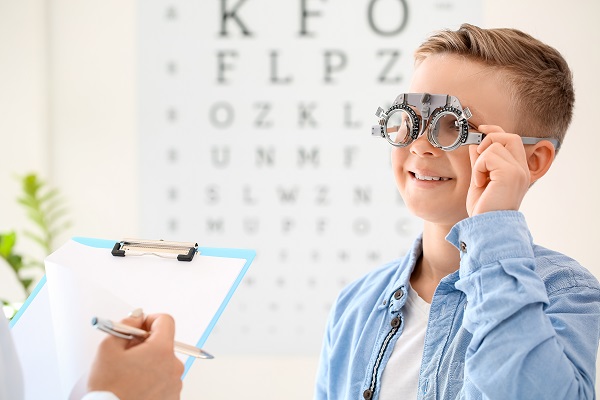Most very young children have their eyesight assessed as part of their routine developmental checks. While these are very important, they aren’t as thorough as a complete eye test by a qualified optometrist. So, we recommend that your child has their eyes tested from an early age.
Testing before your child goes into full-time education means that any problems that they may have are identified early. The sooner vision problems are detected, the better the outcome.

What to expect during your child’s eye examination:
Children’s eye tests are a little different from adults eye tests. We use specially designed charts that allow children to recognise shapes or pictures, or even to match letters. This means that we can test children’s eyes even if they are unable to read or recognise letters.
Most children will need to have drops instilled to both eyes. These drops will dilate their pupils and relax the eye muscles for a better result. These drops known as cyclopentolate sting on administration and can take 30 minutes to activate. So, allow plenty of time on the day of their eye appointment.
Dilating drops can make the vision blurred and the eyes sensitive to light. Most children tolerate it well. The drops can last anywhere from 12 hours to 24 hours.
We assess children’s eyes for:
- Amblyopia or lazy eye
- Squint or turn in the eye
- Needing glasses
- Colour vision
We correct your child vision using:
- Glasses
- Contact lenses
- Myopia control lenses to slow down myopia progression
- Sports eyewear protection
- Water sports eyewear protection
Signs your child might need an eye test
There are a number of things to look out for:
- Straining their eyes or tilting their head to see better
- Frequent eye rubbing
- Losing their place while reading or using a finger to guide their eyes
- Sensitivity to light and/or excessive tearing
- Falling behind in school
- Complaining of headaches or tired eyes
- The presence of a ‘turn’ in the eye or a misdirection of the eyes
- Consistently sitting too close to the TV or holding a book too close
- Avoiding activities which require near vision, such as reading or homework, or distance vision, such as participating in sports or other recreational activities
- Closing one eye to read, watch TV or see better
Stellest Lenses
Essilor Stellest lenses slow down myopia progression by 67% on average in comparison to regular single vision lenses. These lenses are designed with cutting-edge technology to address the growing concern of myopia progression in children. At Donal MacNally Opticians, we are commited to providing the latest innovations in eyecare to ensure the best outcome for your child’s vision health. We will make your child feel comfortable and at ease from the waiting room to the examination chair.
Request an appointment online or contact us if you would like to speak to a memeber of our team.

